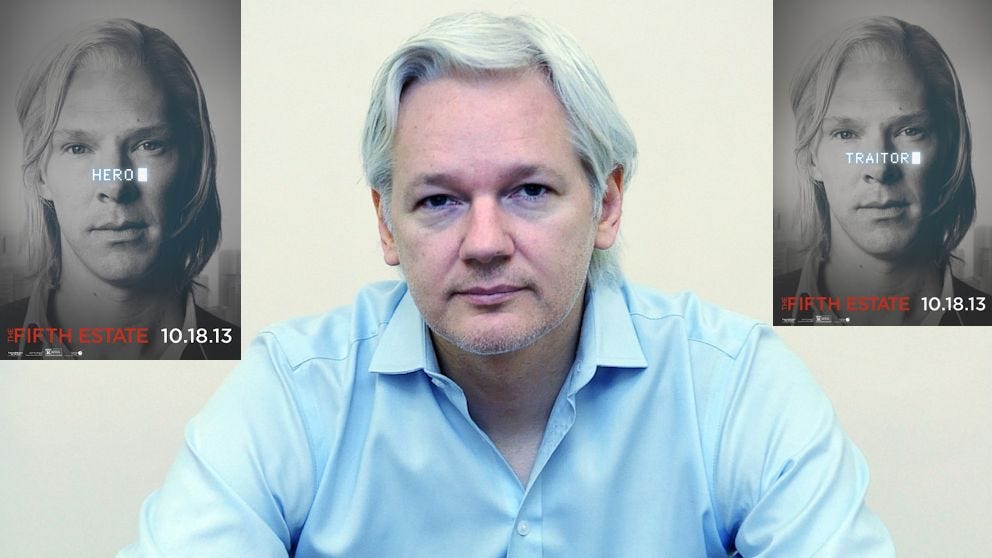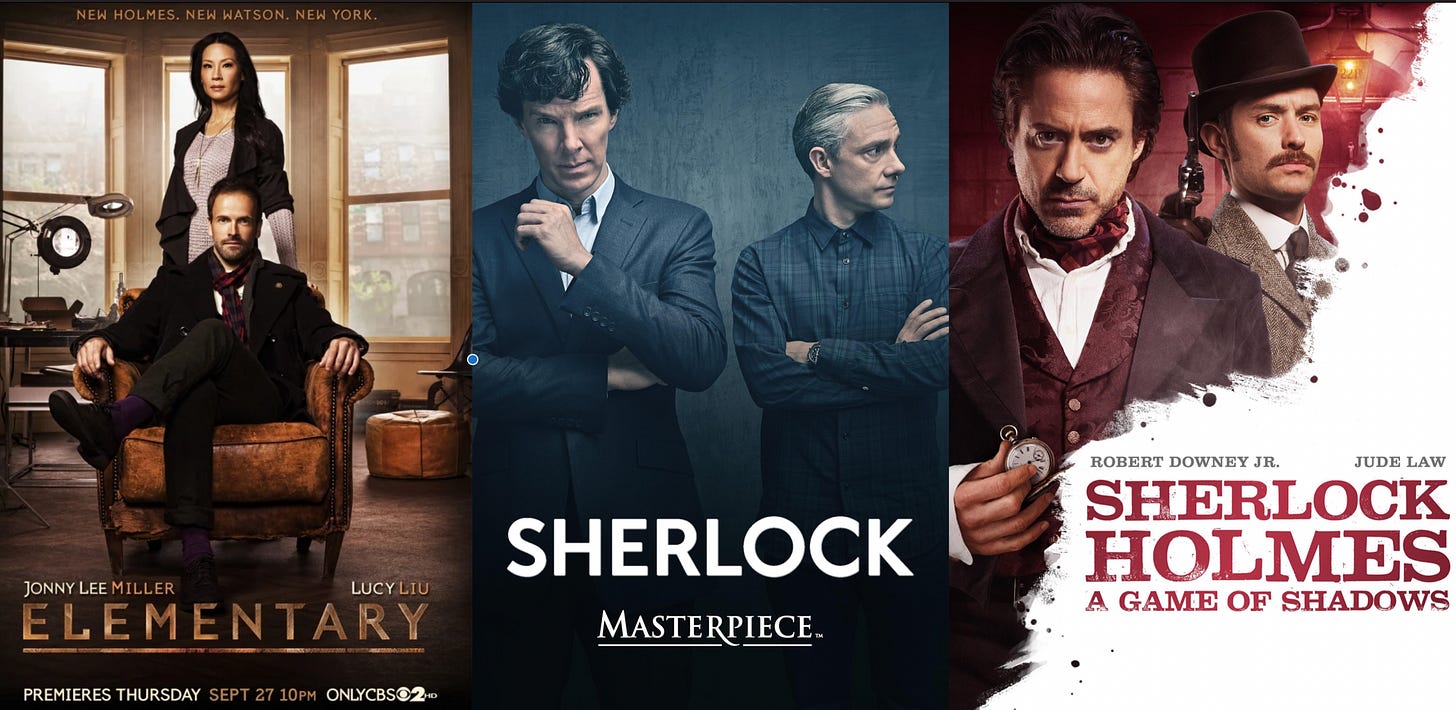OCCULT JOURNALIST: Julian Assange & 'The Fifth Estate'
The 21st Century's Greatest Free Speech Hero Seems Free At Last

“All these so-called rebels, rock & roll bullshit — they’re all conformists. You don’t want to be a fucking slave, right? They don’t want anybody who isn’t going to bend over for them. You’re not complying — and they want you to comply.” — Van Morrison
“Non-conformity is the only real passion worth being ruled by.” ― Julian Assange
$ $ $ $ $ $
[A portion of this Substack was originally published in Mediapost, October 21, 2013.]
That top-loaded quote from the greatest singer/songwriter of the past 60 years rings so true to me. Because as a former corporate journalist who escaped, I can quite easily and comfortably say the exact same things about the vast majority of my former peers, all of whom have failed their profession, their heritage and themselves.
So fuck ‘em. And there’s no bigger “Fuck you!” to all the garbage lying propagandists in the controlled corrupt collectivist corporate criminal clown media who pimp for the global Military-Entertainment-Pharmaceutical Industrial Complex (M.E.P.I.C.!) than the unexpected plea bargain and bail release from a British prison yesterday of Wikileaks’ founder and First Amendment martyr Julian Assange.
“Julian Assange is free,” Wikileaks posted in a statement on Xwitter yesterday evening. “He left Belmarsh maximum security prison on the morning of 24 June, after having spent 1,901 days there.” (There’s that 9-1-1 combo again!)
After a total of twelve years in captivity — first seven years holed up in the Ecuadorian embassy in London, then the past five years in a high-security prison in southeast London — Assange, who was 40 when this torture started, agreed to plead guilty to a felony charge related to his (alleged) role in whistleblowing war crimes of the United States in Iraq and Afghanistan, via the leak of nearly half a million secret military documents.

The agreement between the U.S. Department of Justice and Assange states that the government prosecutors will seek a 62-month sentence — exactly equal to the amount of time Assange served in a U.K. jail while he fought extradition. The plea deal — which still needs to be approved by a Federal judge — will credit those 62 months as time already served, and allow Julian Assange to return to Australia.
Not trusting the Xiden fakeministration, Assange’s attorneys also negotiated that the hearing, plea and sentencing will not take place in the United States proper but instead the U.S. protectorate of the Northern Mariana Islands, a Pacific island chain roughly 3,700 miles west of Hawai’i. They’re also a lot closer to Australia.
There’s a lot of conspiracies to theorize around Assange — there’s more strangeness surrounding his travails over the past dozen years than can be captured in a paragraph, but let’s just say he sure looks plump and healthy in those photos today, especially for a guy who we had been told was on the verge of death not so long back — but not today. Today, I’m recycling a relevant film review.
To commemorate the release of Assange, and to remind yourself why mainstream “journalists”, wicked witch Hillary Clinton, the Pentagon, Israel and the “Israel lobby”, CIA and presumed “Pizzagate” pedophiles (some concentric circles there) all hate Assange, I highly recommend Bill Condon’s flawed but undeniably entertaining rapid-fire docudrama thriller about the short glorious/notorious heyday of the whistleblower website Wikileaks, The Fifth Estate.
The Fifth Estate maybe isn’t as good as it could have been or should have been, but it’s still a terrific piece of popular entertainment aimed at the middlebrow moviegoer. We all would’ve been better off if it had been a multiplex hit, but it wasn’t. It bombed.
At the time, I thought it stood a shot, if for nothing more in our celebrity-driven culture than the brilliant perfect casting of the at-the-time ubiquitous Benedict Cumberbatch, best of the period’s multiple Sherlock Holmes wannabes (topping RDjr and Johnny Lee Miller), and bad guy in the second terrible JarJar Abrams-McGrath Star Trek re-imagining.

Cumberbatch delivers a captivating and magnetic performance as Wikileaks’ founder/mastermind/hero/villain/Svengali figure. He brings the film a fascinating, darkly charismatic core, even when its narrative gets choppy or the dialog a bit too pat (“Only someone so obsessed with his own secrets could come up with a way to reveal everyone else’s,” someone notes at one point).
The screenplay, adapted from a couple books about Wikileaks, is serviceable and has an earnest, quality TV feel, not surprising once you discover it’s the first filmed script from Josh Singer, a writer for The West Wing, Fringe and Law & Order, among other series. But the pacing is sharp and snappy, and Condon — who’s directed an incongruous mix of movies ranging from the art-house fare of Gods & Monsters and Kinsey to a couple multiplex blockbuster Twilight flicks — effectively captures the crackling electric vibe of an action thriller despite subject matter built upon two guys who spend much of the movie looking at their laptops.
That “other guy” is German technology activist Daniel Domscheit-Berg (played by Daniel Bruhl), who was Wikileaks’ spokesperson and a conduit to other collaborators for Assange; basically the Robin to his Batman. Domscheit-Berg’s book, Inside WikiLeaks: My Time with Julian Assange at the World's Most Dangerous Website, is one of the pieces of source material for the movie, so of course he comes off as the much more sympathetic character (with the much hotter GF to boot). Assange IRL has downplayed Domsheit-Berg’s importance to Wikileaks, but without him the movie would flounder — we get to know Assange through Domsheit-Berg’s eyes, and watch him devolve from somewhat sympathetic anti-hero to megalomaniac, all of which the gung-ho Cumberbatch makes highly compelling to observe.
But past the entertainment value of the film, the most valid reason for the general public to watch The Fifth Estate is for the reminder of how much valuable clandestine information the renegade website brought to light in a mere five years. Also, how much breaking news Wikileaks served up like a softball for the news media to clobber, while simultaneously instigating doubts about how much is being missed by the mainstream media information complex now that Wikileaks has been largely neutered.
An incomplete list of major Wikileaks scoops: Swiss bank Julius Baer enabling huge tax evasion for billionaires through its Cayman Islands branch (and the U.S. government at first siding with the bank to shut Wikileaks down); publishing Scientology’s secret “bibles”; Sarah Palin’s confidential government Yahoo account; a serious Iranian nuclear power plant accident, which later turned out to be sabotage; the brutal"collateral murder" video from Iraq, which killed two Reuters reporters (among others), and its subsequent U.S. cover-up; and a few more, before finally climaxing with the biggest of them all – the massive Department of Defense data dump from Chelsea (née Bradley) Manning.

That’s about when all hell breaks loose in act two, and the film starts to slip its focus, concentrating on U.S. diplomats (Laura Linney and Stanley Tucci, good as ever, but….) and a deep-cover double agent in Africa who’s threatened with exposure by the Manning documents.
The film’s third act is much more interesting as it peripherally depicts the government and its minions in the media working to invert the cultural conversation from the damning information that's been revealed, to a mass media popularity contest that an obsessive, damaged, narcissistic asshole like Assange can’t possibly win. It's a sobering portrait of how the modern mainstream media morphs fact-based information into personality-driven gossip, and it would’ve been good to have more of it because that’s another facet of this story the (wo)man-on-the-street should think about.
Assange went on a PR whirlwind (well, as much as a whirlwind as you can deliver when you’re holed up inside the Ecuadorian embassy) before the film’s release, saying the motion picture is a hatchet job. But I didn’t find it that way at all. Assange was certainly blessed that they cast Cumberbatch; the guy’s a phenomenal actor, and he’s got a knack for embodying smart, distinct characters who are appealing despite their shortcomings.
Through the lens of Cumberbatch, Condon and Singer, my takeaway from The Fifth Estate is that Assange is a deeply flawed man with limited social skills rooted in a tough childhood, but driven by a strong sense of justice and faith in the openness of the internet. And that it requires a person with a massive ego to take on The Powers That Be.
In the end, that’s what I think it all comes down to. You’ve got to have a bit of a Messianic streak in you if you think you’ve got any shot at all at taking down The Establishment. Nice guys don’t do it, don’t even try. If the movie painted Julian Assange as a misunderstood nice guy, as I’m sure he would prefer, nobody would buy it. Because it’s surely not true.
The film ends abruptly, but it gives Assange the last word, with Cumberbatch as Assange answering questions in an interview. The last question is about the very movie we just watched, and he rips it pretty good. Irony? Inverted soundbyte marketing move? Overcompensation? Hero? Villain? Does it even matter? If you leave the movie discussing what it all means and what you just saw, then it’s a success and Assange, whether he likes it or not, should be happy. And not only because then you’ll be talking about him.




Remember the fling he had with Pam Anderson during his final days at the Ecuadorian embassy? What the heck was that about? Was she a honeypot sent in by intelligence agencies to figure out exactly what he knew (and any dead-man switches he might have had) before making their move? I don't know. It seems bizarre that it was all so highly publicized. You'd think if it were some type of op aimed at Assange that we wouldn't have heard a peep about it. Someone wanted the world to know that Pam Anderson, of all people, was spending time with Assange.
Pure fire as always. Thank you Tom.